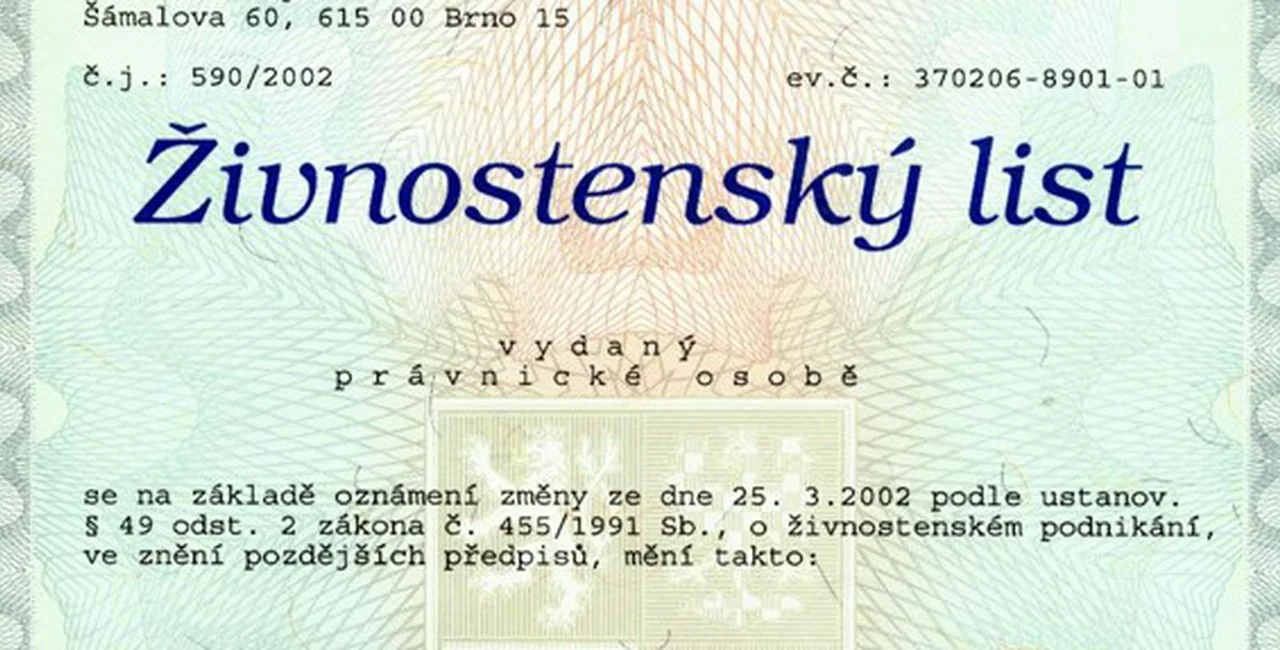One of the common routes to doing business in the Czech Republic is though a sole proprietorship, often called a trade license. A sole proprietor (osoba samostatně výdělečně činná, or OSVČ) is a physical person who has income from carrying out a business and/or self-employment (a freelancer or entrepreneur). A sole proprietor may be registered with the Commercial Court (Obchodní soud), or the trade license regulator (živnostenský úřad). The sole proprietor is liable without limitation, and trades on his-her own full name – to which s/he might attach some differentiating trade name. S/he must be 18 years of age, have a clean criminal record. The annual accounting records of the company may be kept using either simple or accrual accounting. Sole proprietors do not need to file accounts with the commercial court’s document repository (sbírka listin), nor register for a databox (datová schránka) for e-communication with the government unless they choose to do so.
A sole proprietor might also be regulated under a special law, e.g. notary, tax advisor, journalist, farmer, etc. Or s/he might have income from shares of participation as a partner in a limited partnership (komanditní společnosti). We will focus here primarily on tradespersons registered with the trade license regulator, however.
Formation of a sole proprietorship
Sole proprietorships can be formed in 1-5 days after filing papers with the trade license regulator. You will need to file the application on a Monday or Wednesday, as other days are by appointment only. Preparing forms in advance (downloadable from the internet) is also advised. Applications can be processed while you wait, although generally staff will merely accept the forms and check the documentation and provide you a registration within a few days. Comprehensive services in this area are provided by accounting and business services firms, as well as many legal offices, but with patience and determination you can do it on your own. Fees for formation can vary depending on the level of hand-holding provided, 5,000–10,000 CZK being representative.
To form a sole proprietorship, the entrepreneur files with the trade license regulator a registration form describing the full name and personal details, residential and legal place of business (místo podnikání), and list of selected trades. The application must also contain photo identification, proof of citizenship or legal residency (usually a long-stay or permanent residence visa), a foreign criminal record extract or affidavit confirming you have no criminal record, depending on your country of origin, a property deed (výpis z katastru nemovitosti) and owner permission (souhlas vlastníka) for your place of business, trade license selection form, and a stamp tax of 1,000 CZK per trade license.
Trades are divided into free (volné) and regulated trades. Most trades fall under the free category, but others are regulated, like accountants, interpreters and medical professionals may require proof of higher education, professional certifications, etc. Professional liability assurance (bonding) can usually be obtained for these regulated trades.
The trade license regulator will obtain a criminal record extract on your behalf from the Czech criminal register. Sole proprietors will need to obtain the same from their home countries or any other country where they lived more than 3 years, or potentially an affidavit from their embassy in Prague for a fee (U.S., U.K., others). The Canadian embassy is apparently able to do it for no fee.
If the owner of the address where your sole proprietorship will be registered is a company, it will be necessary to provide an original corporate certificate of that company. The permission agreement will be signed by the director or a representative, with a power of attorney from the director.
Taxes and Regulation
A sole proprietorship is regulated by a great number of government entities; the most significant are the trade license and finance and social insurance regulators, and a health insurance company. Employees of a sole proprietor are taxed in the same way as employees of an s.r.o. – we will not consider these regulations or taxes here (see section on s.r.o.s). Sole proprietors generally must file an income tax return (daňové přiznání) each year by March 31, and health and social insurance returns (Přehled o příjímech a výdajích OSVČ) by April 30. While sole proprietors without permanent residence in the Czech Republic are not eligible to participate in the public health insurance program, they are required to possess insurance of a type known as complex, or komplexní. Most sole proprietors will be obligated to pay into the Czech social insurance system, but others (like Americans) might be able to elect to pay elsewhere for a period of up to 5 years. Foreigners are advised to obtain a certificate of social security coverage from the country into whose system they are paying.
Direct taxes are calculated from taxable income, which will be either revenues less deductible expenses, or, under the percentage of revenue option, generally 40% of revenues. You can keep accrual or simple accounting books and still use the percentage of revenue method. Health and social insurance, meal and entertainment expenses, or poorly-documented expenses are not deductible. Both health and social insurance taxes max out at 1,809,864 CZK of taxable income.

Financial Regulator
You will need to register with the financial regulator within 30 days for self-employed income tax. You may also register for VAT if you want to be able to reclaim VAT on eligible business expenses, or road tax if you will operate a car as part of the business.
Income tax: 15% of the taxable income.
Sole proprietors must pay monthly advances on social insurance and health insurance that are netted against the annual liability due in April. The regulator/health insurance company provides a summary of advances received to the payer each February. In the first year of business, the advance will be set to the minimum amount; in subsequent years, to the amount of tax paid in the prior year. The amount of social insurance advances paid depends on whether self-employment is your main or secondary source of earned income. (See health and social insurance section).
Social Insurance Regulator
Most likely you will need to register for social insurance if you are self employed. You might not have to if you are not subject to the Trade License Act (e.g., a journalist) or if you are covered by a certificate of coverage under a foreign program. For example, American citizens who are self-employed are permitted to continue to pay into the US system, even if they work in the Czech Republic, for up to 5 years.
Most entrepreneurs will be considered to have self-employment as the main source of income. If you are an employee or receive any number of government entitlements, your self-employment may be considered a secondary source of income. This will impact especially the amount of the advance that you need to pay.
Social Insurance: 14.6% of the taxable base
2012 minimum monthly advance: 1,836 CZK (main); 735 CZK (secondary)
Health Insurance Company
If you are a citizen, permanent resident or also an employee in a company based in the Czech Republic, you are obligated to register for public health insurance. If you are not one of these, you are required under the terms of your visa to obtain health insurance that meets certain minimum conditions.
Health Insurance: 6.75% of the taxable base
2012 minimum monthly advance: 1,697 CZK
This is but a brief summary of issues confronting an entrepreneur interested in conducting business through a sole proprietorship. Follow our Doing Business series for more information on conducting business in the Czech Republic.
***
John W. Mohr is director of CFO2GO entrepreneurial advisory, delivering online and outsourced accounting, domiciliary and financial advisory services to internationally-financed businesses and expats in the Czech Republic. www.cfo2go.eu entrepreneur@cfo2go.eu
Related articles












 Reading time: 6 minutes
Reading time: 6 minutes 


















